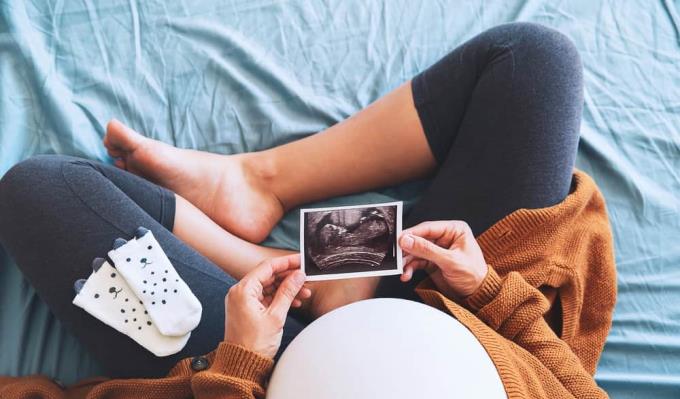Many pregnant mothers still wonder whether menstruation during pregnancy can happen or whether this phenomenon of vaginal bleeding during pregnancy is due to many other factors behind.
According to experts, it is impossible to be pregnant and menstruate. So the cause of this bleeding phenomenon is what, why are there still cases when pregnancy is supposed to happen? If you are having similar questions, let's find out with aFamilyToday Health through the following article.
Menstruation during pregnancy: This is not possible
The reason why you can't get pregnant and still have a period is because the menstrual cycle occurs only when an egg is not fertilized with sperm .
When eggs are not fertilized, the levels of hormones in the reproductive organs decrease. They are substances that control the release of eggs into the fallopian tubes and thicken the lining of the uterus , creating favorable conditions for fertilized eggs to "nest" easily.
When the uterine lining is unable to serve the purpose of pregnancy due to the absence of fertilization, the part of the uterus begins to separate from the uterine wall, creating a period.
If you become pregnant, the uterine lining will not be removed and this is why "missed period" is considered one of the most recognizable and early signs of pregnancy.
Although women are unable to get their period while pregnant, you can still bleed for certain reasons.
Cause you to bleed during pregnancy
Some of the reasons that make mothers vote for vaginal blood during pregnancy and think they are having periods include:
1. In the first trimester
Vaginal bleeding is quite common during the first trimester . Spotting occurs when the placenta successfully attaches to the uterus, which many people often refer to as the pregnancy report. Other causes of bleeding during the first trimester of pregnancy include:
Ectopic pregnancy
Infection
Miscarriage
Hemorrhage under the lining or hematoma under the membrane
Gestational Trophoblastic Disease (GTD): This is a very rare condition that causes the uterus to contain abnormal fetal tissue.
2. After the 20th week

The reasons for having vaginal bleeding during this time are:
Cervical examination : During prenatal examination , your doctor may examine the cervix for any abnormalities and this procedure may cause mild bleeding in the vaginal area.
Placenta: This is a condition that occurs when the placenta attaches to or on the opening of the cervix.
Preterm birth or labor: During labor, the cervix relaxes and the uterus contracts to help move the fetus down. This can lead to bleeding.
Sex: Most women can have sex during pregnancy if there are no problems. Besides, when close to the husband, the pregnant mother will bleed slightly due to the increased sensitivity of the vaginal tissue and the cervix.
Broken uterus: This is a ruptured uterus during labor. This condition is rare, but it is more likely to occur if the pregnant mother has had a cesarean section or surgery on the uterus before.
Premature placenta: This is where the placenta begins to separate from the uterus before the baby is born.
Vaginal bleeding during pregnancy, when should pregnant mothers go to the doctor?
If you experience any of the following conditions, you should see your doctor immediately for prompt examination and treatment:
The vaginal discharge is bright red and you will need a tampon
Heavy bleeding or blood clot
Fainting or dizziness
Severe pain in the abdomen
Pelvic pain
The phenomenon of vaginal bleeding easily makes many pregnant mothers mistakenly think that they are having a period while pregnant. However, as mentioned above, this is not possible, so if you have unusual bleeding, you should see a doctor to determine the exact cause for a timely remedy.
You may be interested in the topic:
How long can I get pregnant when terminating a pregnancy?
All about pregnant women infected with herpes virus during pregnancy
Pregnant women drink fish oil: Benefits and notes attached












